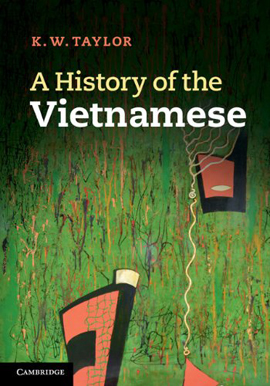New book explores history of the Vietnamese
By Kathy Hovis

Keith Taylor, professor of Vietnamese studies in the Department of Asian Studies, never set out to become an expert on Vietnamese history. But his experience in the Vietnam War made a reasonable choice.
Taylor is the author of the new book, “A History of the Vietnamese” (Cambridge Concise Histories).
The 696-page book covers 2,000 years of Vietnamese government, culture and life, from the Qin Empire in 221 B.C. to the present day.
“I find interest in the Vietnamese past not because it is Vietnamese but because it is about how human society has been organized and governed during many centuries on the edge of an empire,” Taylor writes in the introduction.
Taylor was two weeks out of George Washington University with a history degree in 1968 when he decided to volunteer for the army rather than be drafted as many of his friends were. He hoped that by signing up he could choose an alternate location or position. But when he was sent for training in Vietnamese language, he knew where he was headed.
“I didn’t fall in love with the country or anything like that,” he said. “I hated being in the war.”
But after the war, with little idea of a career path, a former professor encouraged him to focus his interest in history on Vietnam. After teaching at Meiji University in Tokyo, The National University of Singapore and Hope College, he came to teach at Cornell in 1989, in part because of the vast resources of Cornell Library’s Echols Collection related to Vietnam and Southeast Asia.
Still, he was unable to find many English language books for his students about Vietnam that didn’t focus solely on the period of the Vietnam War.
“Most of what was written about Vietnam was coming from a group of academics who were anti-war,” Taylor said. “It was simply a recycling into English of the wartime propaganda coming out of Hanoi.”
Taylor sought a deeper understanding of the longstanding conflicts between North and South Vietnam, the role of religion, including Catholicism, in the country’s development, and the ongoing relationship between Vietnam and China. He also struggled with war-related questions about the non-communist government in Saigon and the U.S. involvement in Vietnamese affairs.
“Vietnamese history, as it’s been taught, is such a claustrophobic place,” he said. “I wanted to open it up, to let some air in.”
While his latest book is organized chronologically around political and historical events, Taylor includes scores of references to literature, culture, religion and economics of the various time periods, as well as the people and personalities of each era.
“I endeavored to provide as much opportunity as possible for readers to enter the past and to see events from the perspective of those who lived them or who recorded them,” Taylor writes in the book’s introduction. “If we imagine the past with the dynamism of possibility with which it was lived, we can glimpse it looking back at us with the eyes of aspiration that each human life and each generation have aimed at the future.”
Taylor is also the author of “The Birth of Vietnam” (1983) and co-editor of “Essays into Vietnamese Pasts” (1995),“Views of 17th-Century Vietnam: Christoforo Borri on Cochinchina and Samuel Baron on Tonkin” (2006) and “Monde du Viet Nam – Vietnam World, a book of essays to honor Professor Nguyen The Anh” (2008). He is at work on a book about 19th-century Vietnamese poet and statesman Nguyen Cong Tru.
Kathy Hovis is a writer for the College of Arts and Sciences.
Media Contact
Get Cornell news delivered right to your inbox.
Subscribe